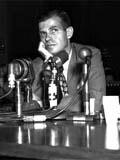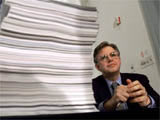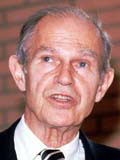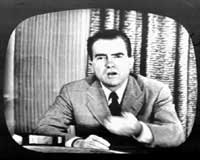
Alger Hiss Grand Jury Testimony
Released
Nixon's Role Defined in Pivotal Perjury Case
Oct. 12, 1999
By Amy Worden
NEW YORK (APBnews.com) -- A new
window opened on the Cold War today
with the release of thousands of pages
of testimony from the federal grand
jury hearings of former State
Department official Alger Hiss, a
celebrated perjury case that
represented a pivotal moment in
American history and ushered in the
Communist witch hunts of the 1950s.
The release by the Justice Department
of 4,200 pages of transcripts, 50 years
after Hiss was indicted, shows for the
first time the extent to which
then-Rep. Richard Nixon fought to win
an indictment against Hiss and tried to
protect congressional probes to root out Communist spies within
the federal government.
"This sheds new light on a very controversial part of history," said
historian Bruce Craig, one of a group of scholars that sued for
access to the materials. "For the first time we have the ability to
tell the story of the Hiss controversy in its earlier phases and the
central role Nixon played in bringing about an indictment of Hiss."
The release comes five months after a
landmark ruling by Judge Peter
Leisure of the federal district court in
Manhattan who found that historical
importance outweighed grand jury
secrecy in the Hiss case. Grand jury testimony is almost always
sealed in perpetuity.
Nixon depicted as shrewd manipulator
In May, the government voiced its objections to the release of the
Hiss records, despite the fact that 50 years had passed and the
key witnesses are deceased. U.S. Attorney Mary Jo White had
said she would appeal the ruling, but did not.
Most illuminating, historians say, is
the portrait the records paint of Nixon,
then a 35-year-old member of the
House Committee on Un-American
Activities, for whom the Hiss case
would become a springboard to
national acclaim. The testimony
reveals Nixon as a shrewd
manipulator, willing to ignore perjury
allegations against Hiss' chief
accuser, Whittaker Chambers, a
confessed Communist and former
senior editor of Time magazine, in the
hope of landing the much bigger fish -- Alger Hiss.
In one dramatic flourish, Nixon teases jurors by holding up the
microfilm containing secret State Department records known as
the "Pumpkin Papers" and warns the court it will have to take him
"by force" before he hands over the canisters of tape. Chambers
had hidden the microfilm, which contained secret State Department
records, in a hollowed-out pumpkin on his Maryland farm before
showing it to Nixon and congressional investigators as evidence
Hiss was a spy.
"I will not part with the films. If the
films go into evidence, I go with them,"
Nixon told the grand jury.
'Messenger for the House'
"It was his most brilliant speech before
Checkers," said Craig, referring to
Nixon's famous 1952 televised
presentation refuting slush-fund
allegations but admitting he'd
accepted a gift of a puppy named
Checkers. Craig called it a "clever and
nuanced" appeal to the grand jury from someone who depicted
himself -- as Nixon said -- "solely as a messenger for the House."
"No one outside the grand jury room got to hear it," Craig said.
"Nixon is speaking to us from beyond the grave."
Two days later, the grand jury indicted Hiss on perjury charges. He
was sentenced to 44 months in federal prison.
The Harvard-educated lawyer who
helped in the creation of the United
Nations would spend the rest of his life
as a salesman for a printing company,
twice suing the court to release the
testimony. Hiss maintained his
innocence until his death in 1996 and
was convinced his name would be
cleared when all the evidence was made public.
Glimpse into government interaction
Scholars say while the material does not contain conclusive
evidence of Hiss' guilt or innocence, it offers a much more
complete picture of a case that captivated the nation.
"The smoking gun is nonexistent,"
said Craig, who plans to write a
biography of Hiss based on the new
material. "It offers a much richer
perspective of the interaction between
the Justice Department, House
Committee on Un-American Activities
and the grand jury."
Other historians say the testimony
highlights the rift between the Justice
Department under President Truman
and Congress and raises questions
about the grand jury process at the
time.
"[The records] raise a series of disturbing questions about the
fairness and integrity of the grand jury process, including notably
the 'laundering' of FBI wiretap information, about the covert
relationship between the FBI and House Committee on
Un-American Activities and about the FBI's counterintelligence
failures," said Athan Theoharis, a history professor at Marquette
University in Wisconsin.
Hiss denies guilt before indictment
Scholars and the Hiss family hope the decision will speed the
release of more grand jury testimony, as well as testimony from
congressional hearings on Hiss not scheduled for release until
2026, and encourage the reopening of Russian Cold War-era
archives.
"This is an important part of getting to the bottom of it all," said
Tony Hiss, Alger's son. "It goes a long way to bringing us closer to
the truth."
In his final plea to the grand jury before his indictment, Alger Hiss
said he had "been guilty of no breach of trust," and told them, "I am
sure that the truth will eventually come out."
Amy Worden is an APBnews.com staff writer (amy.worden@apbnews.com).



